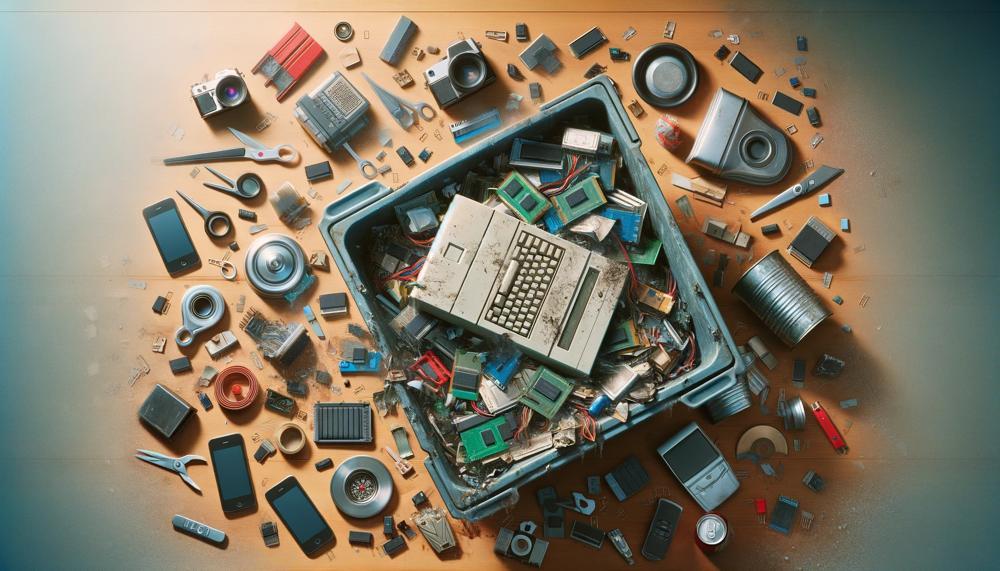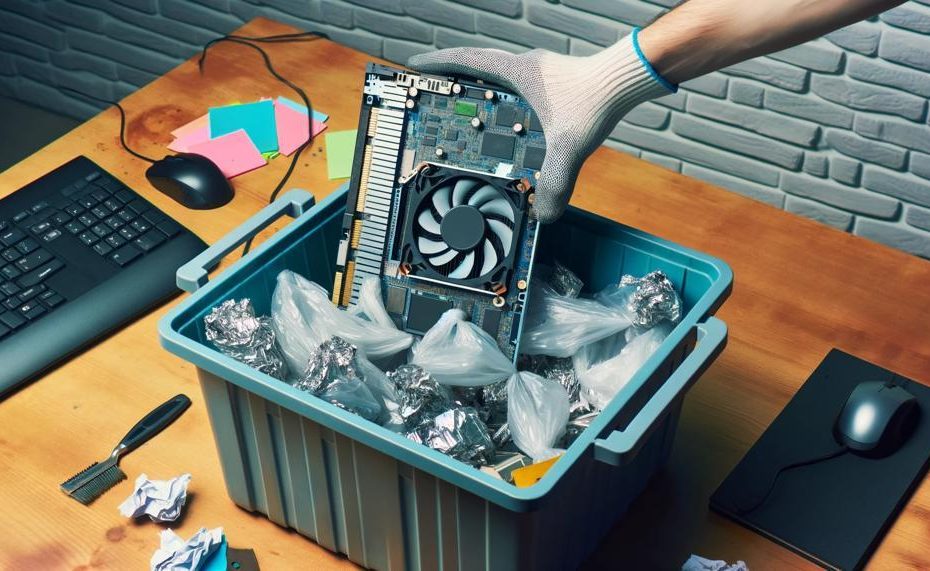Are you ready to part ways with your trusty computer? Whether it’s time for an upgrade or your old device has finally given up, disposing of it may seem like a daunting task. But don’t worry, we’ve got you covered. We’re here to guide you through the process and ensure that you do it the right way. Because let’s be real, simply tossing it in the trash is not only harmful to the environment but also puts your personal information at risk.
So, can you throw away a computer in the trash?
No, you should not throw away a computer in the trash. Computers contain toxic materials and heavy metals that can harm the environment if they end up in landfills. In most areas of the country, it is illegal to throw electronics into the trash or take them to a landfill.
Here are some ways to dispose of an old computer:
- Recycle: Recycle at a certified e-waste center. You can use online resources like RecyclerFinder to find a recycling center near you. Most towns and cities have drop-off locations for computer recycling. Many computer retailers, such as Staples, also offer recycling or trade-in services.
- Donate: Donate functional computers to a charity.
- Salvage: Salvage the best PC components for reuse.
- Find a hazardous waste center: If you can’t throw electronics away with the rest of the trash, try to find a hazardous waste facility.
- Use professional services: If you have a lot of computer equipment to dispose of, there are even professional services that will come to your office to pick up your old tech.
Before recycling, you should properly wipe and destroy the hard drive of your laptop. You can carefully remove the hard drive or, if physically destroying it is not possible, use data shredding software.
By following these ways, not only will you be doing your part for the planet by responsibly disposing of your computer, but you’ll also be protecting yourself from potential identity theft. So let’s give our beloved devices a proper send-off and make sure they are disposed of in an environmentally-friendly manner.
Contents
Is It Safe To Throw a Computer in the Trash?
While it may seem like an easy solution, throwing a computer in the trash can have serious consequences for both the environment and personal security. This method of disposal poses several risks and dangers that should not be taken lightly.
Some of the potential consequences of throwing a computer in the trash include:
Environmental Impact:
Computers contain non-biodegradable materials such as plastic, metal, and glass that can take thousands of years to decompose in landfills. These materials can release toxic chemicals into the environment, polluting the soil and water sources.
This can have devastating effects on both humans and animals, as well as disrupt the natural ecosystem.
Health Hazards:
In addition to harmful materials such as plastic and glass, computers also contain heavy metals like lead, mercury, and cadmium.
If not disposed of properly, these metals can leach into the soil and water sources, contaminating them and causing serious health issues for those who come into contact with them.
Legal Repercussions:
It is important to note that in many regions, throwing a computer in the trash is illegal and can result in penalties for improper waste disposal. This is because computers are considered electronic waste (e-waste) and require special handling for proper disposal.
By not following proper disposal protocols, you may be breaking the law and facing legal consequences.
Personal Data Vulnerability:
One of the biggest risks of throwing a computer in the trash is the potential exposure of sensitive personal data. Even if you delete files from your computer, they can still be recovered by someone with malicious intent. This puts your personal information at risk of identity theft or fraud.
To avoid these dangers and consequences, it is crucial to properly dispose of old computers.
This includes backing up important data, wiping the hard drive clean, and recycling through donation or electronic recycling drop-offs.
What Happens If You Throw a Computer in the Trash?
Disposing of a computer in the trash is not a safe option as it can have serious consequences for both the environment and personal security. Old computers contain harmful materials that can pollute the environment and pose health hazards for humans, animals, and plants.
Moreover, throwing a computer in the trash can also result in legal repercussions and put sensitive personal data at risk. Instead of taking this risk, it is crucial to properly dispose of old computers through recycling or donating.
| Consequences | Description | Solutions |
| Polluting the environment | Old computers contain toxic materials like lead, mercury, cadmium, and brominated flame retardants. When discarded in landfills, these substances can seep into the soil and water, causing harm to the environment and living organisms. | Recycle old computers through e-waste recycling programs or donate them to organizations that refurbish and reuse them. |
| Health hazards | The toxic materials in computers can also pose health hazards for humans, animals, and plants if not disposed of properly. Exposure to these substances can lead to respiratory problems, skin irritation, neurological damage, and even certain types of cancer. | Dispose of old computers correctly through certified e-waste recycling programs or donate them to organizations that refurbish and reuse them. |
| Legal repercussions | In some countries or states, it is illegal to throw electronics in regular trash bins. Therefore, disposing of a computer in the trash can result in fines or penalties. | Check local laws and regulations on e-waste disposal and follow proper recycling procedures to avoid legal consequences. |
| Exposure of sensitive data | Merely deleting files from a computer does not guarantee complete erasure. If a computer ends up in the trash, there is a risk of unauthorized individuals accessing personal data, leading to identity theft or other types of fraud. | Prior to disposing of a computer, make sure to wipe the hard drive clean or physically destroy it to ensure sensitive data cannot be accessed. |
How To Properly Dispose of an Old Computer?
Properly disposing of an old computer is crucial for protecting the environment and safeguarding personal information. This task involves three important steps: backing up data, wiping the hard drive, and recycling or donating the computer.

By following these methods, we can ensure that sensitive information is not accessible to others and that the computer parts are recycled or reused in an environmentally-friendly manner.
Backing Up Data:
Before disposing of an old computer, it is vital to back up all important files and data. This can be done by transferring them to a new computer or storing them on an external hard drive or cloud storage.
This step ensures that valuable information is not lost and can be easily accessed on a new device.
Wiping the Hard Drive:
Simply deleting files from a computer does not permanently remove them. To ensure that personal information cannot be retrieved, it is crucial to completely wipe the hard drive.
This can be done using software designed for data destruction or by physically destroying the drive.
Recycling or Donating:
The last step in properly disposing of an old computer is recycling or donating it. Electronics recycling centers accept old computers for safe disposal and utilize sustainable methods to recycle their components.
Donating old computers to organizations in need also ensures that they are reused instead of ending up in landfills.
The Importance of Proper Disposal:
It cannot be stressed enough how crucial proper disposal methods are for both environmental sustainability and personal safety. Improperly disposing of computers can lead to harmful chemicals seeping into the environment and potential access to personal information.
By properly disposing of old computers, we can reduce our carbon footprint and protect our personal data from falling into the wrong hands.
| Consequences | Description | Solutions |
| Polluting the environment | Old computers contain toxic materials like lead, mercury, cadmium, and brominated flame retardants. When discarded in landfills, these substances can seep into the soil and water, causing harm to the environment and living organisms. | Recycle old computers through e-waste recycling programs or donate them to organizations that refurbish and reuse them. |
| Health hazards | The toxic materials in computers can also pose health hazards for humans, animals, and plants if not disposed of properly. Exposure to these substances can lead to respiratory problems, skin irritation, neurological damage, and even certain types of cancer. | Dispose of old computers correctly through certified e-waste recycling programs or donate them to organizations that refurbish and reuse them. |
| Legal repercussions | In some countries or states, it is illegal to throw electronics in regular trash bins. Therefore, disposing of a computer in the trash can result in fines or penalties. | Check local laws and regulations on e-waste disposal and follow proper recycling procedures to avoid legal consequences. |
| Exposure of sensitive data | Merely deleting files from a computer does not guarantee complete erasure. If a computer ends up in the trash, there is a risk of unauthorized individuals accessing personal data, leading to identity theft or other types of fraud. | Prior to disposing of a computer, make sure to wipe the hard drive clean or physically destroy it to ensure sensitive data cannot be accessed. |
Can You Recycle Computer Monitors?
When it comes to disposing of your outdated computer monitor, there are several options available to ensure proper recycling and avoid harmful environmental impacts. These options include donating, recycling, and utilizing manufacturer or retailer programs.
Donating your monitor is a great way to reduce waste and give it a second life. If your monitor is still in decent condition, consider donating it to someone in need. This follows the principle of “Reduce, Reuse, Recycle” and helps conserve resources. You can donate to thrift stores, charity shops, or even underdeveloped schools that may be in need of computer parts.
If your monitor is no longer functional or useful, recycling is the best option to prevent pollution. Old computer monitors contain toxic materials such as lead, mercury, and cadmium that can harm the environment if disposed of improperly. Recycling these materials instead of throwing them in a landfill helps conserve resources and avoids pollution.
In addition to manufacturer programs, municipal agencies and organizations often organize e-waste collection drives where you can dispose of your monitor for free or a nominal fee. Some retailers also offer free electronics recycling services for items such as computer monitors.
It is important to note that the cost of recycling a monitor may be higher due to its glass content, but it is worth it for the environment’s sake. Before disposing of a monitor, make sure to prepare it by removing any personal information and hazardous components.
Can You Recycle Computer Accessories?
When it comes to recycling, there are various computer accessories that can be included, such as keyboards, mice, speakers, and printer ink cartridges. However, before recycling these items, it is crucial to prepare them properly by removing any batteries or hazardous materials.
Additionally, it is important to ensure that all personal data is wiped from storage devices to protect sensitive information.
To dispose of these items in the most environmentally-friendly way possible, consider utilizing a reputable e-waste recycling program or donating them to organizations in need.
Conclusion
In conclusion, it is imperative to dispose of old computers and their accessories properly to protect both the environment and personal information.
Merely tossing them in the trash can lead to serious repercussions such as pollution, health risks, legal consequences, and even identity theft. Instead, it is crucial to back up important data, wipe the hard drive clean, and consider recycling or donating these items.
Not only does this reduce our carbon footprint, but it also supports organizations that provide technology to those who may not have access to it.





